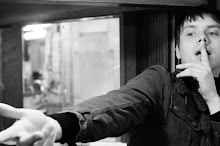Diyarbakir
I wake up late. The hotel room's windowless, tucked away at the end of a corridor, next to the main heating system. It feels like every drop of moisture has evaporated from my body during the past 10 hours that I've slept. Needless to say, I'm in a rather random frame of mind.
Outside, the sky is blue. The main street in town almost has a European flavour, with all the glossy bank fronts and hotels. I walk towards the old castle (now an army base), and the atmosphere starts to change: old men sitting in front to tea houses, dressed in the same clothes that their ancestors had worn for generations, a soldier standing in the guard tower of the 'palace gate', as others had stood for generations. The battlements are massive - circumbulating for 6 km around the city, they form the 2nd longest wall in the world.
Past that gate, it feels like a timewarp. Several old people sit on the sunny steps of the 12thC mosque, doing nothing. I walk past an old woman with a tatooed face. If it wasn't for the discarded plastic bags blowing through the streets and ramshackle powerlines, I could be mistaken for thinking that I'd stepped back 500 years. There are no cars in the narrow streets, no signs advertising anything - only rows of improptu shacks painted in bright blues, yellows, pinks, aquamarines, and hordes of dirty children playing everywhere with their mothers looking on. It feels wrong to photograph this world - an offensive voyeurism, taking something from those who have little without giving anything back. A few of the kids shout, 'Yes! Yes! Photo!' as I walk past. I decide not to take any photos.
I sit on the battlements outside, looking out over the Tygrys. A man walks up to me and asks if I'm a tourist. I tell him that I'm a terrorist. Turns out that he's an undercover cop. Oops. He tells me that I should move on, since the area is dangerous. So I go and get become further lost in the maze of narrow streets. The absence of the supermarket is welcome, as scores of small shops sell all that you'd need in this closed world - from food to cheap plastic balls for kids to play with. Occassionally, men push carts full of vegetables through the streets, shouting out the price. I come to a 15thC mosque with a huge courtyard. 3 young boys surround me. Incredibly cute, they are too young to realise that I don't speak their language, too young to shout 'Hallo! Money! Money!' However, the smallest of them is already waving a pellet gun around.
Back in the town centre, I end up meeting Mohammed, an economics student. We go and have tea at his uncle's carpet shop, in a shady courtyard. I end up asking to see some kilims and sumak. Hasan has many beautiful things - earthy camel wool kilims from Hakkari (Iraq border), pink Armenian kilims, flashy Diyarbakir kilims. He isn't pushy, but has the same problem as all other carpet dealers I've met - can talk but doesn't know how to listen. I end up sorting through piles of kilims myself. Yet my problem with kilims is the same as my problem with women: I keep looking for something that would sweep me off my feet, and if I find it, it is inevitably beyond reach. In the case of Hasan's carpet shop, I pull out a gorgeous green and orange kilim. Turns out that it's approximately 100 years old and costs 1000 Euro.
Afterwards, I worry about my ticket to Urfa. The police station has a tourism info office, but the policeman on duty doesn't speak English. A guy from the municipality police comes, but also can't speak English. He indicates that I ought to follow him. We walk down the main road at a brisk pace and end up at... a cake shop. He shouts me a plate of local baklava (in Diyarbakir, it is made of thin rice noodles and filled with sunflower seeds as well as nuts). Soon, the English-speaking manager of the local electronics store comes and I explain what I want. The policeman ends up taking me to the right ticket office and everything is sorted for tomorrow.


0 Comments:
Post a Comment
<< Home